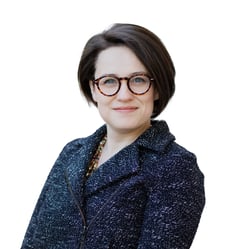
The rich are getting richer, the poor are getting poorer, and the middle class is shrinking.
Meanwhile, social bonds have never been weaker—maybe it’s because of the internet, maybe it’s because latchkey kids became helicopter parents whose children can’t function (guilty as charged!), or maybe it’s because of increased polarization and simple lack of trust of our neighbors. Personally, I blame the internet—but that could be because I’m a luddite at heart who should have used ChatGPT to write this very sentence but didn’t.
And on top of all of this, the practice of all flavors of Christianity is in decline, with more people identifying as religious “nones” every year. This matters because our country has historically been overwhelmingly Christian, which played a key role in our generosity as a society (as Karl Zinsmeister noted back in 2019).
As fewer people adhere to, much less live out, a religious faith, we’re likely to see a pretty steep decline in giving—along with a slew of other new challenges.
All of this means that there will be larger buckets of philanthropic dollars controlled by fewer people, and along with that will come increased suspicion of, and hostility towards, philanthropy; increased calls for more regulation and reform in the sector; and more of the (mis)perception that philanthropy is imposed upon a community rather than coming from within.
As for nonprofits, they’re going to suffer too as their sustaining low-to-mid-level donors dry up along with their supply of mission-critical volunteers.
“Well,” you say, “that’s a lovely bleak picture you’ve painted for us. Any chance you have something slightly more optimistic to end on?”
Yes. I think there are three critical things we can do to help sustain the uniquely American heritage of intermediating organizations, volunteerism, and generosity.
1. Fight to preserve the independence of philanthropy and the nonprofit sector
Our friends at Philanthropy Roundtable are vigilant and effective at leading the charge. I like their hermeneutic for considering charitable regulation: “When considering burdensome rules for charities, lawmakers must ensure they are warranted and tailored to a specific, evidence-based need.”
2. Invest in glue, not solvents
By which I mean: make philanthropic investments that will strengthen and unify your community. Things like community-based nonprofits that serve the needy locally (bonus if they’re religious). Things like beautiful public spaces where people can gather in-person. Like collaborative working spaces for small businesses and local entrepreneurs to keep your downtowns alive. Above all, look to the community and listen to its needs.
3. Foster unity, not division
Philanthropy comes in every size and stripe known to man—but that doesn’t mean we have to be divisive, siloed, and tribal. The Plea for Philanthropic Freedom, signed by heavyweights like Darren Walker and Heather Templeton Dill, gives us a great example of what this kind of unity and civility within our sector can, and should, look like. I quote:
At a time when the nation’s commitment to pluralism is strained, the six of us renew our commitment to philanthropic pluralism and encourage our peers to do the same by embracing a truly healthy independent philanthropic sector that:
- Demonstrates a wide range of views and perspectives on the most important issues confronting democracy and society.
- Benefits from the open and authentic contributions of its constituents.
- Encourages consensus around common values, such as respect and open inquiry, as well as disagreement on contested issues of societal significance."
The whole piece can be found here and is worth a read.
The last thing that needs to be done is so obvious it’s almost not worth saying—but I’m going to say it anyways: give well. Take the time and steps necessary to be strategic, thoughtful, and effective in your giving. And if you’re not sure how to do that or where to start, drop me a line and let’s chat.
About the Author
 Cecilia Diem is a Director and leader of Donor Advisory, AmPhil’s consulting practice serving charitable foundations and philanthropists. In this role, Cecilia advises leading individual and institutional donors on strategy, donor intent, evaluation, governance, operations, and capacity building to maximize the impact of their giving. Previously, she led AmPhil’s East Coast consulting group, where she supported over forty nonprofit clients raising more than $150 million annually. Prior to AmPhil, she held positions at The Philanthropy Roundtable, Americans for Prosperity and Americans for Prosperity Foundation, and the National Museum of Women in the Arts.
Cecilia Diem is a Director and leader of Donor Advisory, AmPhil’s consulting practice serving charitable foundations and philanthropists. In this role, Cecilia advises leading individual and institutional donors on strategy, donor intent, evaluation, governance, operations, and capacity building to maximize the impact of their giving. Previously, she led AmPhil’s East Coast consulting group, where she supported over forty nonprofit clients raising more than $150 million annually. Prior to AmPhil, she held positions at The Philanthropy Roundtable, Americans for Prosperity and Americans for Prosperity Foundation, and the National Museum of Women in the Arts.

